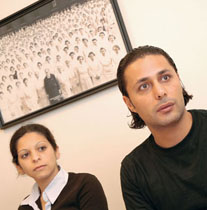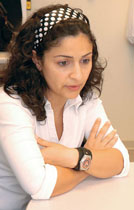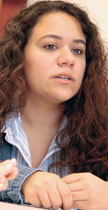Written By Mary Beth Regan
Photos by Christopher Myers
When war broke out in Lebanon, five visiting graduate students in nursing found themselves stranded at Hopkins…

It was to be the academic experience of a lifetime: Five graduate students from the American University of Beirut (AUB) School of Nursing were selected to come to the United States for a seven-week clinical residency program to see how highly trained clinical nurse specialists function in a United States hospital.
Then, on July 12, two weeks before they were to return home, a war broke out.

The students, all of whom remember the bombings of the Lebanese Civil War in the 1980s, found themselves stranded in Baltimore, far from families in Lebanon, without a way to return to their home country. Israel had launched an offensive against Hezbollah in Lebanon.
“The airports were bombed, so no planes could land,” says Rida Gharzeddine, a 28-year-old from Maten, near Beirut, who is studying oncology. “We contacted one professor by e-mail. The school of nursing was deserted, and the classes at the AUB were cancelled. We contacted our families by land-lines and the Internet. They were telling us to stay here in safety until we could get back home,” he says.

Over the next two months, the Johns Hopkins University School of Nursing and the Johns Hopkins Hospital Department of Nursing sponsored the students in what became an out-standing example of a collaborative exchange that will only strengthen the newly created bond between the nursing schools.
In turn, the Lebanese students—the first international nursing students to visit the Johns Hopkins University School of Nursing and Hopkins Hospital as part of a new initiative under the Office of Global Nursing—proved to be warm, gracious guests, even as they dealt with the emotional turmoil of watching their homeland attacked. They patiently explained the political situation and humanitarian crisis in their home country and kept Hopkins faculty up-to-date on news they were receiving from colleagues at home.
“Knowing these students has been a life-changing experience for me,” says Jane Shivnan, MScN, RN, AOCN, director of the Office of Global Nursing, who felt personally responsible for the five. “They have been wonderful ambassadors for their country. They have been wonderful ambassadors for the field of nursing.”
In Lebanon, the situation was grim: Electricity had been wiped out across the country. Fuel was in short supply. At least one hospital closed. Patients had difficulty reaching the hospitals due to heavy bombing. And doctors and nurses worked double-shifts, trying to keep pace with health care demands.
Fortunately, all five students were able to confirm that their families had not been harmed. Still, the images of the bombs haunted them. “It reminds us of the same sounds we heard in the shelters when we were children during the war,” says Gharzeddine. “And at night, I am having bad dreams.”
| “When I speak with my professors at home, every day they say they are proud of Hopkins. They feel safe sending their students here.” |
| —Rita Gharzeddine |
In all, one million of the country’s 3.5 million people were displaced during the 34-day siege. An estimated 1,000 Lebanese civilians were killed during the fighting.
By early September, even after the United Nations had negotiated a cease-fire, the students still could not return home because air travel into Lebanon was nearly impossible, and only through neighboring Jordan.
One student, Grace Khatcherian, had gone to California to stay with an aunt, at her family’s urging. “It’s so confusing,” Khatcherian said, in a telephone interview. “You come with a suitcase for seven weeks and you don’t know when, or if, you are going back.”
During the day, Shivnan’s challenge was to keep the students connected to Hopkins, engaged in worthwhile work and moving toward their own goals of being healthcare leaders upon their return. The students focused their attention on attending graduate level nursing courses and participating in rotations at Johns Hopkins Hospital, and they received guidance on their individual master’s theses. They were not licensed to work in the U.S., so they could not seek employment.
Rafika Zaatari, a 24-year-old student from Beirut, who specializes in pulmonary intensive care, says the time in the U.S. helped her understand further the role of the clinical nurse specialist. In the U.S., the clinical nurse specialist is an advanced practice nurse role that com-bines clinical practice, education, and research.
“We have studied the theory and we have read about it,” Zaatari says. “We have not seen it in practice.”
Upon return to Lebanon, the five nursing students will become among the first clinical nurse specialists in their country, each becoming education and research experts in their respective fields of HIV/AIDS, pain management, pulmonary intensive care, oncology and geriatrics.
The student exchange is part of a broader initiative between the Johns Hopkins University School of Nursing and AUB Nursing School to support education, research and nursing practice in Lebanon. JHUSON faculty and a nursing graduate student, for example, have helped develop plans for an AUB Center for Community-Based Care. Hopkins Nursing faculty also have explored ways to help AUB faculty conduct scientific research—a key step toward developing doctoral programs for nursing and medical students there.
Both Hopkins administrators and the AUB nursing students say the crisis came with a silver lining. “The relations between Hopkins and AUB will be even stronger as a result of this crisis,” Gharzeddine says. “When I speak with my professors at home, every day they say they are proud of Hopkins. They feel safe sending their students here.”
Postscript: The students had planned to return home on July 23, 2006. It wasn’t until September 9 that Rafika Zaatari and Suha Ballout returned to Lebanon via Jordan. On October 21, Sarah Abboud and Rida Gharzeddine were able to fly directly from the United States into Beirut’s International Airport. In a recent e-mail to the SON, Abboud notes that she misses “the peace of mind that one can live with in the States, and not having to worry about basic things like we do over here.”
Grace Khatcherian, who traveled to Ventura, CA to stay with her aunt during the crisis, remains there and now has a contract to begin working at a local hospital.